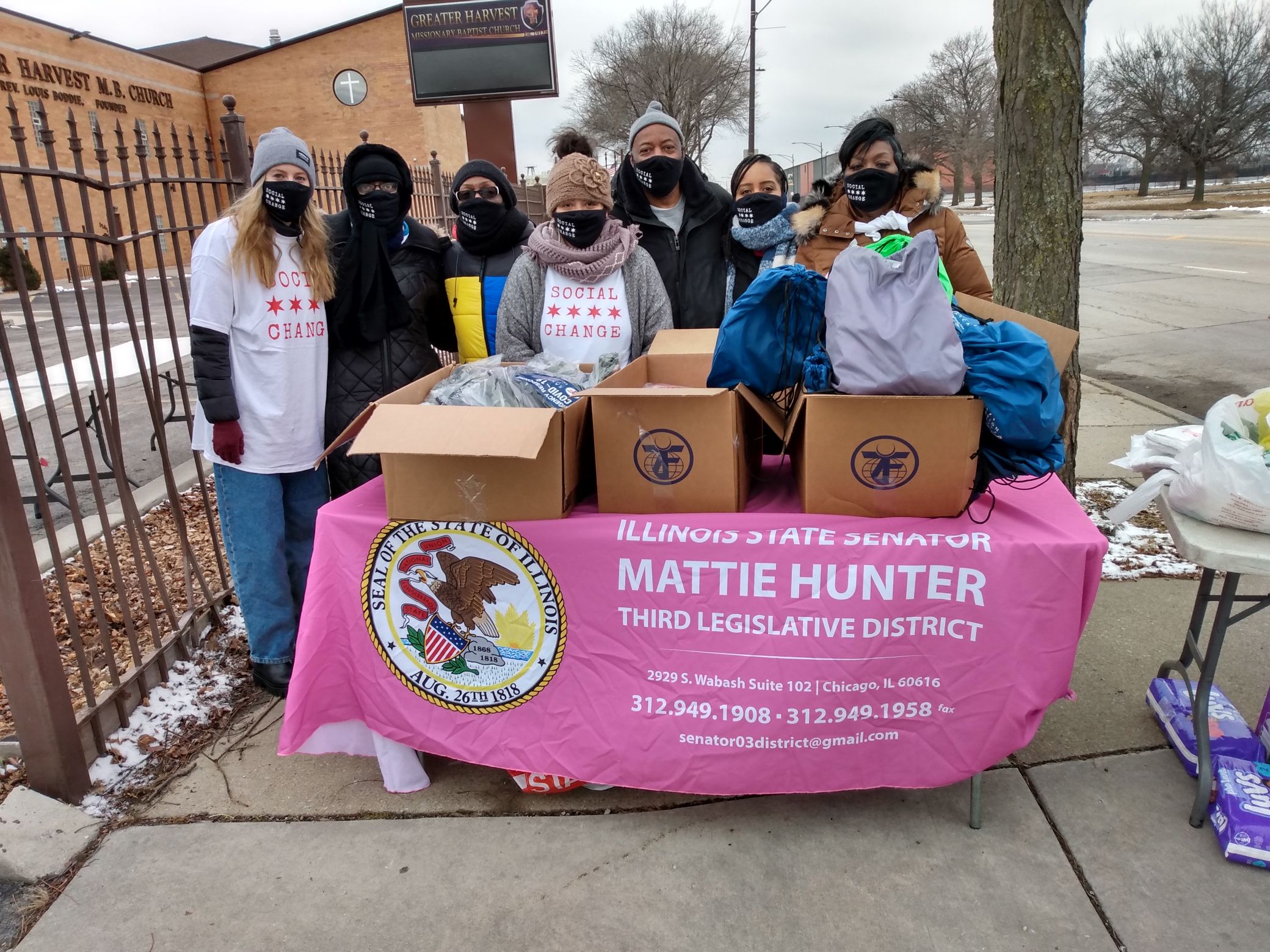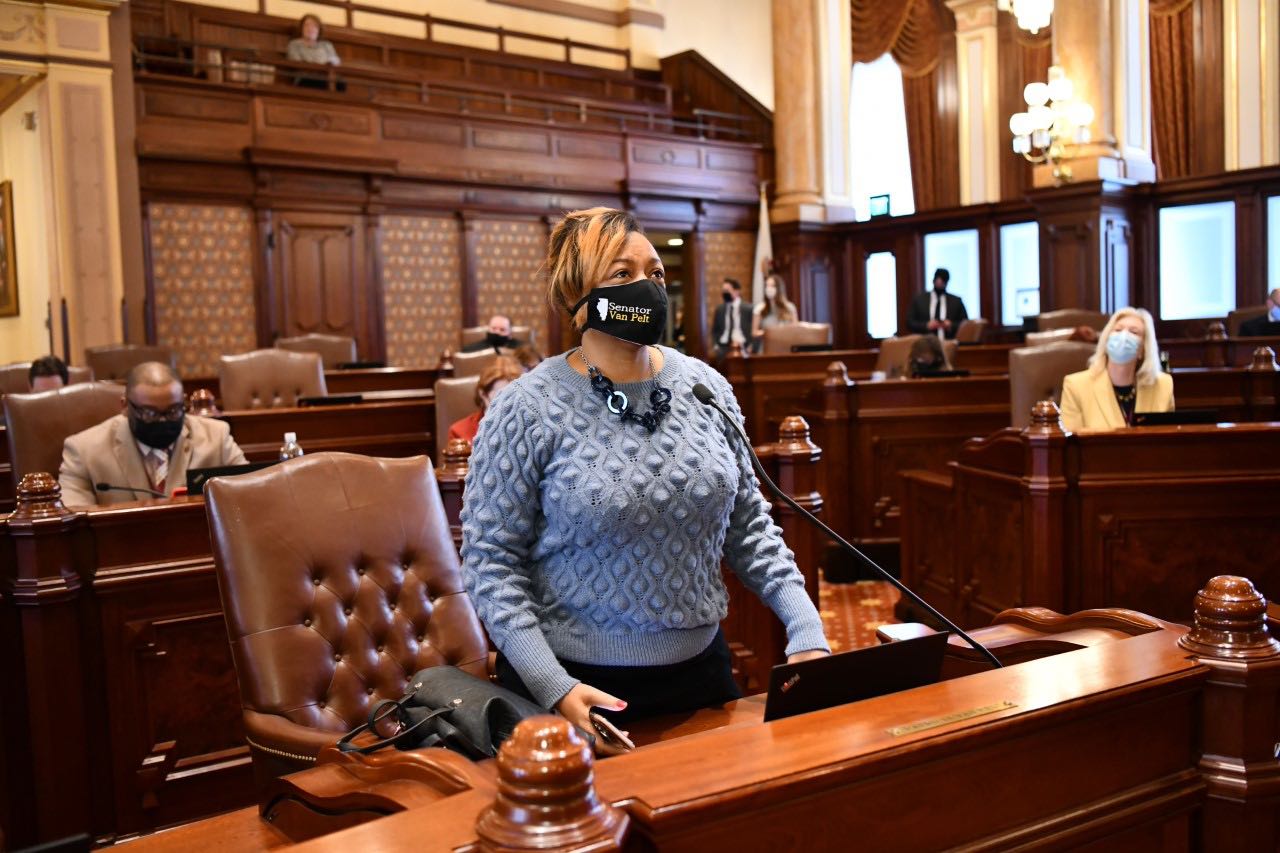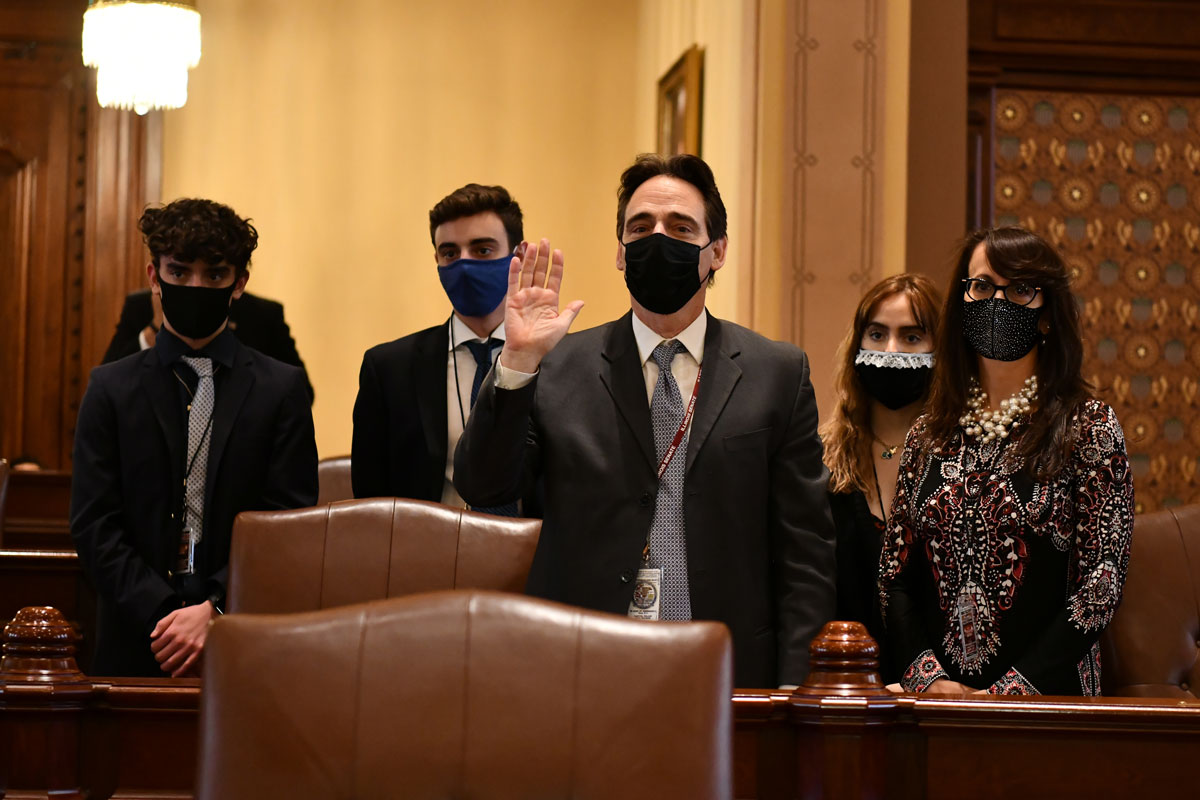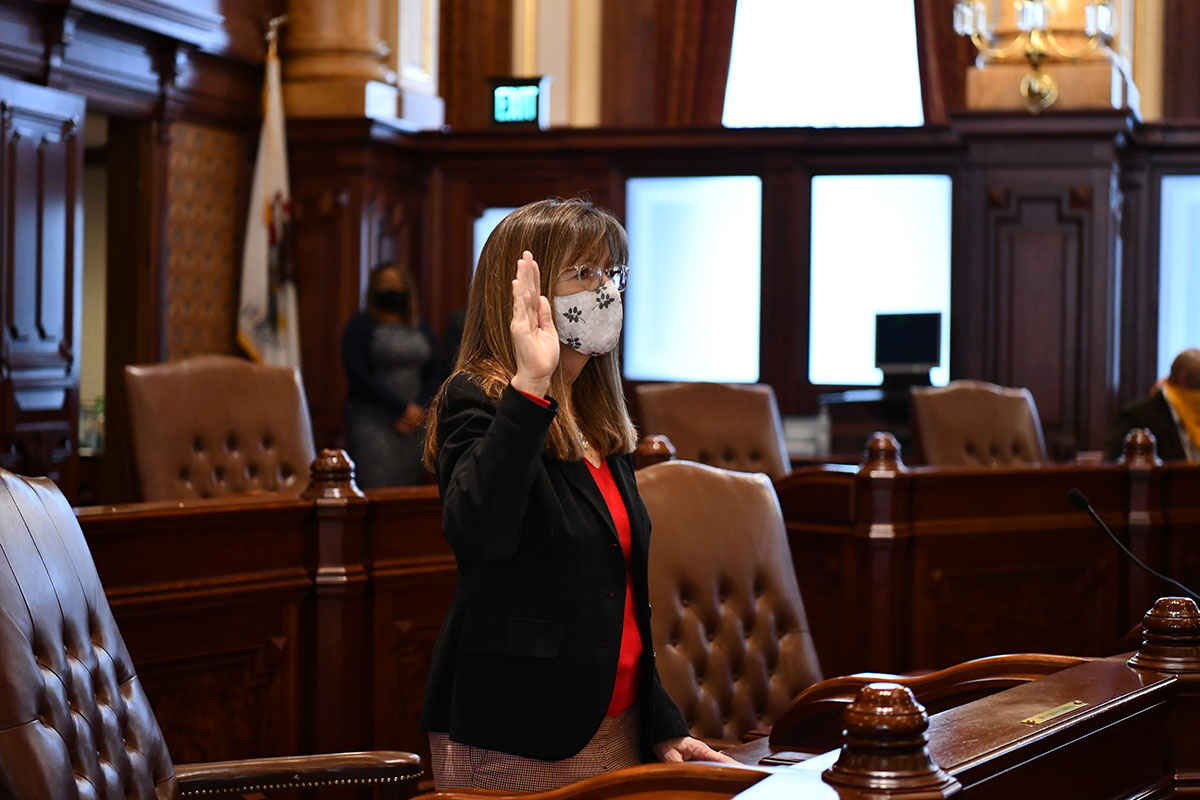- Details
- Category: Senator John Connor News
 As the new session begins, the Senate is pleased to welcome four new members to the body. They bring a range of professional and personal experience as well as valuable subject matter knowledge, and we can’t wait to see what they will contribute to our work for the people of Illinois.
As the new session begins, the Senate is pleased to welcome four new members to the body. They bring a range of professional and personal experience as well as valuable subject matter knowledge, and we can’t wait to see what they will contribute to our work for the people of Illinois.
- Details
- Category: Senator Mattie Hunter News
 SPRINGFIELD – State Senator Mattie Hunter (D-Chicago) voted to pass multiple measures last week to advance the Illinois Legislative Black Caucus agenda, hoping to improve racial equality throughout the state of Illinois.
SPRINGFIELD – State Senator Mattie Hunter (D-Chicago) voted to pass multiple measures last week to advance the Illinois Legislative Black Caucus agenda, hoping to improve racial equality throughout the state of Illinois.
“My colleagues and I have worked tirelessly for the last several months to create a plan that gets to the root of systemic injustice and rectifies the inequities facing our community piece by piece,” Hunter said. “I’m grateful to see that many of our ideas will soon come to fruition, and I’m excited to see our communities benefit.”
Read more: Hunter excited to see progress on Black Caucus legislative agenda
- Details
- Category: Senator Mattie Hunter News
 CHICAGO – In the spirit of Martin Luther King Jr. Day, State Senator Mattie Hunter (D-Chicago) partnered with Social Change to donate food and PPE at the Greater Harvest Missionary Baptist Church.
CHICAGO – In the spirit of Martin Luther King Jr. Day, State Senator Mattie Hunter (D-Chicago) partnered with Social Change to donate food and PPE at the Greater Harvest Missionary Baptist Church.
“People are still struggling to protect themselves from this virus while awaiting the wide distribution of the vaccine,” Hunter said. “PPE is still needed, and people are still in need of other basic necessities like food. Everyone loves to quote Dr. King, but those who follow in his footsteps are not as common.”
- Details
- Category: Senator Jacqueline Y. Collins News
 CHICAGO – Payday lenders will be prohibited from issuing loans with rates higher than 36% and Illinois government will require certain financial institutions to meet the needs of local communities under major reforms led by State Senator Jacqueline Collins (D-Chicago) and the Illinois Legislative Black Caucus this past week.
CHICAGO – Payday lenders will be prohibited from issuing loans with rates higher than 36% and Illinois government will require certain financial institutions to meet the needs of local communities under major reforms led by State Senator Jacqueline Collins (D-Chicago) and the Illinois Legislative Black Caucus this past week.
Language from two major pieces of legislation by Collins, Senate Bills 1608 and 1792, were included in a comprehensive Black Caucus economic reform measure that passed the Illinois General Assembly Wednesday.
“How many of you want to get a credit card, maybe from Macy's or Neiman Marcus, at 80%, 99%?” Collins asked senators in her remarks prior to the bill’s passage in the Senate. “This is preying on certain communities. It's really a rebirth of redlining, housing covenants and all the other ills that have decimated my community. What we're trying to do is ensure they have an opportunity to build economic stability.”
Read more: Collins wins tougher regulations on payday lenders, new Community Reinvestment Act
- Details
- Category: Senator Patricia Van Pelt News
 SPRINGFIELD – During the lame duck legislative session, Senator Patricia Van Pelt (D-Chicago) voted to pass legislation that will enact major criminal justice reform in the state of Illinois.
SPRINGFIELD – During the lame duck legislative session, Senator Patricia Van Pelt (D-Chicago) voted to pass legislation that will enact major criminal justice reform in the state of Illinois.
“I am proud that my colleagues and I were able to pass such monumental measures this week,” Van Pelt said. “With the implementation of these provisions, we hope to prevent tragedies like the ones we’ve seen in the past several years. The deaths of George Floyd and Breonna Taylor, the violation of Anjanette Young—all situations that could have been avoided with such legislation in place.”
Read more: Van Pelt proud that Illinois is one step closer to major criminal justice reform
- Details
- Category: Senator Steve Stadelman News
 SPRINGFIELD –State Senator Steve Stadelman (D-Rockford) was sworn in to serve the 34th Senate District for another term Wednesday.
SPRINGFIELD –State Senator Steve Stadelman (D-Rockford) was sworn in to serve the 34th Senate District for another term Wednesday.
Stadelman, from the greater Rockford area, was originally elected to serve in the General Assembly in November 2012. Previously, he worked as a professional journalist and reporter in the Rockford area for two decades.
Over the past eight years, Stadelman has fought for education reform, to bring an Amtrak route to Rockford, to help upgrade local youth sports facilities, to protect Illinois’ consumers, to help abuse victims and to fight for college students.
“It’s an incredible honor to continue to serve the Rockford area,” Stadelman said. “I look forward to getting back to work to help the people of Rockford and the state of Illinois as we continue to face this public health crisis.”
Stadelman’s district office is located at 200 S. Wyman St., Suite 301, in Rockford. People can contact his office at (815) 987-7557, or at www.senatorstadelman.com.
- Details
- Category: Senator Melinda Bush News
 SPRINGFIELD – State Senator Melinda Bush (D-Grayslake) released the following statement after being sworn in to serve the 31st District for another term in the General Assembly:
SPRINGFIELD – State Senator Melinda Bush (D-Grayslake) released the following statement after being sworn in to serve the 31st District for another term in the General Assembly:
“Serving the people of Northern Lake County has been an immense honor. Last year, more than ever, I learned just how important the legislature can be.
“During a year where we faced an ongoing public health crisis, grave racial injustice and divisive politics, I was reminded that it’s imperative to use my voice and my position to fight for the rights and lives of all Illinoisans.
“As I took the oath today, I was reminded of every life unjustly lost, every family who struggled to make ends meet and every small business that was forced to shut its doors during the past year. I was reminded I must uphold my duty to best serve the people I represent, so no one else has to suffer.
“Thank you, to the people of the 31st District, for trusting in me to continue to represent you at home and in Springfield. My work to make Illinois and the Northern Suburbs a better, safer and more inclusive place to live is far from over.”
Senator Bush has served the 31st District since 2013.
- Details
- Category: Senator Meg Loughran Cappel News
 Plainfield – State Senator Meg Loughran Cappel (D- Shorewood) was sworn in to the 102nd General Assembly as state senator for the 49th District Wednesday.
Plainfield – State Senator Meg Loughran Cappel (D- Shorewood) was sworn in to the 102nd General Assembly as state senator for the 49th District Wednesday.
“I am excited and humbled to continue representing the 49th District in Springfield,” Loughran Cappel said. “As we begin the next legislative session, especially in these unprecedented times, I am ready to fight to ensure the people in my community have the resources they need to be healthy and successful.”
Before being elected to the Senate, Loughran Cappel served the community as a special education teacher, a school board member and a volunteer at various organizations throughout Will County.
“My experience as a small business owner, a teacher and most importantly, a mother has given me unique insights into some of the issues facing our district,” Loughran Cappel said. “I look forward to working with my colleagues in the Senate to make this state better.”
The 49th State Senate District includes all or parts of Joliet, Plainfield, Bolingbrook, Romeoville, Shorewood, Oswego, Crest Hill, Boulder Hill, Naperville, Montgomery, Aurora and Channahon.
More Articles …
Page 571 of 765













 © 2026 Illinois Senate Democratic Caucus
© 2026 Illinois Senate Democratic Caucus